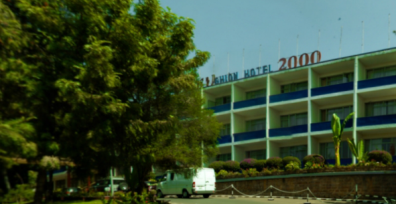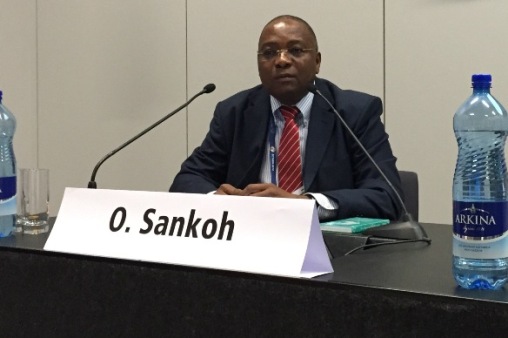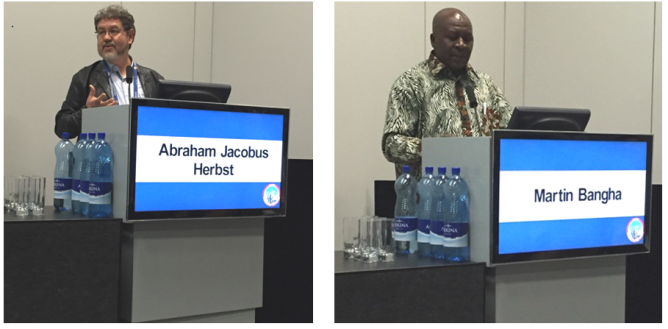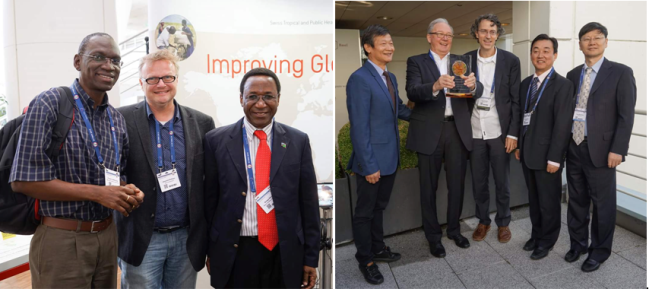| Dear Centre Leaders,
Greetings from the INDEPTH Secretariat. We hope you have had a good week.
We have the following items for your attention:
1. INDEPTH at ECTMIH 2015
The INDEPTH Network was well represented at the just ended European congress on tropical medicine and international health (ECTMIH) held in Basel, Switzerland from 6-10 September 2015.
The Executive Director of the INDEPTH Network, Prof Osman Sankoh; INESS Project PI and former INDEPTH ED, Prof Fred Binka; INDEPTH’s Capacity Strengthening and Training Manager, Dr Martin Bangha; and several member Centre Leaders including Ifakara, Dodowa, Navrongo, Kintampo, Agincourt, Africa Centre, as well as INDEPTH representatives from it projects, Working Groups, Scientific Advisory Committee (SAC), Bernhards Ogutu, Peter Waiswa, Peter Byass, attended and made presentations at the conference.
Prof Osman was the Chair/Organiser of the Session Titled: Population health - the use of health and demographic surveillance systems with a keynote address by Kobus Herbst.
Dr Bangha made an oral presentation titled: "Adult mortality in sub-Sahara Africa: Evidence from INDEPTH member Health and Demographic Surveillance Systems".
The INDEPTH session was well attended by a large number of participants.
2. “We need best science for neglected diseases”
The Board Chair of the INDEPTH Network, Prof Marcel Tanner, has stressed the need for the best science for neglected diseases on a global level.
"We need the best science for those most neglected on a global level," he said.
Prof Tanner, the immediate past Director of the Swiss Tropical and Public Health Institute, Swiss TPH, said this at the European congress on tropical medicine and international health (ECTMIH) which was organised by the Swiss TPH. Prof. Tanner is the president of the scientific committee of the conference.
"We need platforms such as this congress, which better connects the various players from the fields of research, implementation, and policy and leads to concrete solutions," said Marcel Tanner. New knowledge from research, local know-how, and financial and human resources need to be pooled and shared.
The topics discussed during the five days covered a wide range, from issues of increased global mobility and growing social and political instability, to the environment and health, population growth, diseases of poverty, social and economic determinants of health and well-being, and the benefit of 'Big Data' in health monitoring and prevention.
3. Study calls for re-orientation of healthcare priorities
The apparent transition in the cause of deaths in the community calls for the re-orientation of healthcare priorities. This is according to a study conducted by the Ballabgarh HDSS, a member of the INDEPTH Network, on mortality surveillance using verbal autopsy tool revealed a transition in the cause of deaths from respiratory diseases to cardiovascular diseases over the decade.
The paper titled "Decadal transition of adult mortality pattern at Ballabgarh HDSS: evidence from verbal autopsy data" was presented at INDEPTH Scientific Conference in Johannesburg, 28-31 October 2013. INDEPTH provided travel award for participation in the conference.
Mortality levels and patterns are significant indicators of population health, and are of importance to prioritise the goals of health systems and efficient resource allocation. Verbal autopsy (VA) is a useful tool in such settings to establish the probable cause of death (COD) by interviewing a caregiver or a close person who provide witness to the death event.
The study, therefore, ascertained the decadal transition of mortality pattern in adult population aged 15 years and above during the years 2002–2011.
For the study, all adult deaths aged 15 years and above during the years 2002 to 2011 were included in the study.
The cause of death was ascertained by verbal autopsy tool for adults which is a validated questionnaire developed at the Ballabgarh Health and Demographic Surveillance System (HDSS). The cause and age specific mortality, and mean age at death was determined for individual years.
A total of 4,276 deaths (≥15 years) occurred in the Ballabgarh HDSS during the years 2002 to 2011. Of these, 96.8 % deaths were investigated using verbal autopsy tool. Of total deaths investigated, 60.6 % were males. For more information, read the attached publication.
Please see the attached publication for details.
4. Vacancy: Head of Surveillance – Kilifi Research Programme
This post is required to co-ordinate a diverse and large programme of epidemiological and demographic surveillance. The post will also oversee and co-ordinate the activities of fieldworkers engaged in surveillance in the community and health-care facilities (including hospitals and dispensaries). The post will be based within a scientific department (i.e. Epidemiology and Demography) and report to the Departmental Chair and to the Programme Director & nbsp; We are moving to unify the management of our surveillance platform and this new post (i.e. Head of Surveillance) will support that transition.
Please see attached for details.
5. Call Extended: 2015 ADDRF Fellowships for Doctoral Research on HIV/AIDS Prevention and Vaccine Trials in West Africa
The African Population and Health Research Center (APHRC), in partnership with the International Development Research Centre (IDRC), are pleased to announce a call for applications for doctoral fellowships in HIV/AIDS prevention and vaccine trials in West Africa. These fellowships are expected to contribute to the creation of sustainable capacity and leadership to conduct HIV/AIDS prevention trials with special focus on innovations in HIV/AIDS prevention technologies, particularly HIV vaccines.
The ADDRF Programme will award up to seven (7) fellowships in 2015 to doctoral students who are citizens or residents of a West African (ECOWAS) country AND who are who are affiliated to a research/academic institution in an ECOWAS country.
The new deadline for the application is 4 October 2015.
Please see attached for details.
6. ISC/AGM 2015 Registration
 All sites/centres that have not registered for the ISC 2015 are encouraged to do so. All sites/centres that have not registered for the ISC 2015 are encouraged to do so.
The ISC will take place from 11 - 13, November 2015 in Addis Ababa, Ethiopia.
Arrival: 10 November 2015, Departure : 14 November 2015
Annual General Meeting: 14 November 2015 for Centre Leaders (Departure : 15 November 2015)
The registration link is http://indepth-network.org/isc2015.php
Please note that it is a membership requirement to attend the AGM in Addis Ababa.
|




